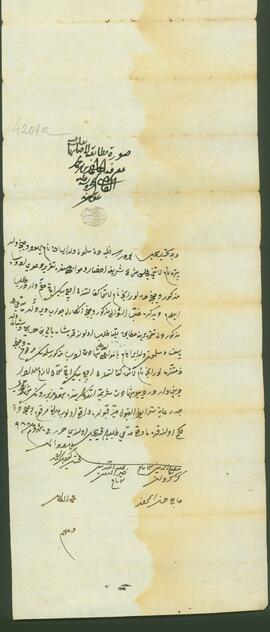Dohana (Customs duties and taxes)
- HR-DADU-44-HR-DADU-44.1
- Series
- 13th century - 19th century
The series consists of various books that can be divided into following groups according to the content of registers: registers of customs duties on merchandise (including name of the trader and the amount of customs; avere and dare), registers of collection of fees for the use of warehouses on the premises of the Customs House (name of the trader and the amount of fee per month; avere and dare), registers of debtors to the Customs House (name of the trader and the amount of the debt; avere and dare), registers of taxes on meat (gabella di carne); registers for the collection of duties and fees to owners of pubs, registers of goods disembarked from ships (including data on the port from which the ship sailed, the list of goods, the amount of customs duty), registers of customs duties on money deposits in Italian banks, registers of trade of goods stored in the warehouses of the Customs House, registers of collection of fees for selling ship shares, books of investigations kept by customs officers and judgements that were reached, books of expenditures of the Customs House, and various indexes made according to the first name of the person involved in the case (with a reference to the page number, but without information on the book these indexes refer to). Most registers contain documents on collection of customs, lists with names of debtors to the Customs House and documents providing data on collection of fees for the usage of customs warehouses. The first volume of this series is the Customs Statute of the Dubrovnik Republic from 1277.
The series is very important for researching trade affairs of Jews and for reconstructing their business network in the Balkans and on the Mediterranean Sea. References to Jewish merchants can be found in most of the above-mentioned registers of the series. The data provided in the registers of the series are very diverse: identifying the type of goods, ports, and cities from which the goods were delivered, amounts of customs duties, and amounts of collected fees for the use of warehouses, as well as the names of traders. There are many references to Jewish traders, especially in the documents that date from the 60s of the 16th centuries, and among various Jewish families referenced to in this period there are families such as Abeatar, Abensaxen, Abenun, Abuaff, Amariglo, Baruch, Cabiglio, Catinella, Cidi, Cussi, Coen, Danon, Del Rei, Dios, Ergas, Esperiel, Finzi, Lindo, Maestro, Miranda, Membre, Moscato, Oef (Ohev), Pappo, Pardo, Rodriga, Samaria, Sasso, Zacharia. Notable Jews from that period also referenced to in the series are Daniel Rodriga, Didacus Pyrrhus (Isaiah Coen) (e.g., vol. 10, ff. 108v, 109), Isac Ergas (the legal representative of Gracia Mendes) and his brother Samuel. An important fact that needs to be pointed out regarding this fonds is that some members of the Jewish community in Dubrovnik are identified in these documents as leaseholders of the warehouses belonging to the Customs House since the end of the 16th century. The community paid an annual rent in the amount of 750-770 perpers for these premises (e.g., vol. 21, f. 34). The data revealed in another study on Jewish families living in that period (1546-1940) also confirm that some Jewish families cease to be referenced, and names of other Jewish families begin to be referenced in the 17th century. The data of this series from the 17th century thus show references to Jewish family surnames (last names) such as Abeatar, Abenun, Abudente, Baruch, Coen, Consolo, Danon (Bendanon), Esperiel, Lanciano, Luzzena, Oef, Macchioro, Maestro, Miranda, Pappo, Penso, Ribera, Sages, Saralvo, Senior, Zevi. Very notable Jewish merchants among the above mentioned were Aaron, David, Elazar and Raphael Coen, and Jacob and Tsadik Danon. The name of a Jewish merchant Isaac Jeshurun (vol. 22, f. 81v) particularly stands out: he was a merchant who was accused in 1622 of committing a ritual murder of a girl from Dubrovnik. The records show that the books of this series from the 18th century provide multiple data on different members of some other Jewish families such as Ambonetti, Baraffael, Campos, Costantini, Fermi, Janni, Levi, Levi Mandolfo, Luzzena, Maestro, Nahas, Pardo, Penso, Russo, Valenzin, Vitali.

